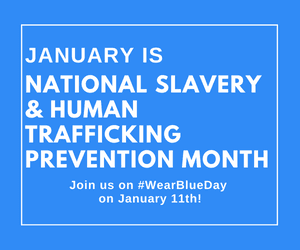
January marks National Slavery and Human Trafficking Prevention Month, an opportunity to raise awareness of human trafficking—a grievous crime that results in severe human rights violations worldwide. We invite you to take this time to deepen your understanding of this pervasive issue, learn to recognize its warning signs, and support efforts to end human trafficking.
Understanding Human Trafficking
Human trafficking, often described as a modern form of slavery, occurs when traffickers use force, fraud, or coercion to control individuals and exploit them for commercial sex acts or labor against their will. This crime affects people of all ages, genders, and backgrounds, stripping individuals of their autonomy, safety, and dignity.
The Intersection of Human Trafficking and Domestic Violence
Human trafficking often intersects with domestic violence, creating compounded layers of trauma for survivors. According to Freedom Network USA, a coalition of advocates fighting human trafficking in the United States, traffickers often:
- Perpetrate domestic violence while simultaneously exploiting their victims for labor or sex;
- Use a survivor's history of abuse to manipulate and control them;
- Intimidate survivors by leveraging their prior victimization to erode trust in others or institutions.
These intersections make it even harder for survivors to seek help, as trauma, fear, and distrust often act as barriers to accessing support and services. Addressing these overlaps is critical to providing holistic care for survivors.
Human Trafficking Legislation in New York State
In New York State, sex trafficking and child sex trafficking are classified as class B felonies, carrying severe penalties. Since 2018, legislation has been strengthened to address key aspects of human trafficking awareness and survivor support. In 2022, additional measures were enacted, including:
- Informing human trafficking victims about available online resources and support;
- Requiring businesses with alcohol licenses to display posters with trafficking information;
- Mandating that public spaces post details about services for human trafficking survivors.
While these legislative steps are critical, there remains an ongoing need to build awareness, educate the public, and expand resources for survivors.
How to Recognize the Signs of Human Trafficking
Each of us can play a role in combatting human trafficking by learning to identify the warning signs. Red flags include:
- Signs of physical abuse or malnourishment;
- Underpayment or non-payment for labor;
- Excessive or unsafe working conditions;
- Individuals being unable to leave their work or home premises;
- Lack of identification or personal documents;
- Underage individuals involved in the commercial sex industry.
By understanding these indicators, you can help identify and assist victims, while also spreading awareness within your community.
Take Action: Participate in #WearBlueDay
To show solidarity and raise awareness about modern slavery, join the movement on January 11th for #WearBlueDay. Simply wear blue—the color of human trafficking awareness—take a selfie, and share it on social media using the hashtag #WearBlueDay.
This small action can make a powerful statement, helping to educate others and amplify the voices of survivors.
Expand Your Understanding: Explore These Resources
To deepen your knowledge of human trafficking and its connections to domestic violence, consider exploring the following expert resources:
- What is Human Trafficking? - National Human Trafficking Hotline
- Recognizing Human Trafficking - Polaris Project
- National Human Trafficking Training and Technical Assistance Center (NHTTAC)
- Human Trafficking and Domestic Violence - Freedom Network USA
- Human Trafficking and Domestic Violence Fact Sheet - Human Trafficking Legal Center
- Human Trafficking Awareness Month Toolkit - Center for Prevention of Abuse
Together, We Can Make a Difference
Raising awareness, learning to recognize the signs, and supporting survivors are critical steps to ending human trafficking. Let’s use National Slavery and Human Trafficking Prevention Month to commit ourselves to education, advocacy, and action—ensuring a safer, more just future for all.
For additional support or to report suspected trafficking, contact the National Human Trafficking Hotline at 1-888-373-7888 or text "HELP" or "INFO" to 233733.


